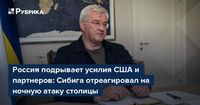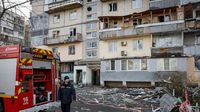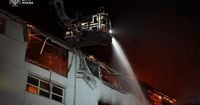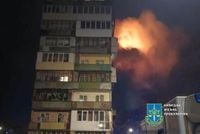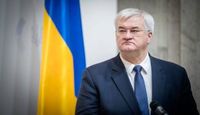In a dire escalation of hostilities, Russia launched a massive drone attack on Kyiv during the night of March 23, 2025, targeting residential areas and civilians. The assault, which involved 147 drones, resulted in significant damage across multiple districts and tragically claimed the lives of three individuals, including a father and his five-year-old daughter. Ukrainian Foreign Minister Andriy Sybiga condemned these actions, stating that such systematic terror undermines international peace efforts.
"Today at night, Russia launched a massive drone attack on Kyiv, targeting residential areas and civilians asleep in their homes. This violence contradicts any claims of seeking peace and only serves to escalate the situation further," stated Sybiga in a post on social media. His remarks underscore the gravity of the ongoing conflict and the urgent need for heightened international response.
The drone attacks in Kyiv were not isolated incidents but part of a pattern of aggression that has included similar strikes in cities like Kropyvnytskyi, Zaporozhye, and Odesa over the preceding week. Reports indicate that these coordinated strikes resulted in injuries to at least ten people, highlighting the indiscriminate nature of the attacks on civilian infrastructure.
Sybiga emphasized that Russia's actions contradict its own statements about promoting peace while waging war. He argued for the necessity of Ukraine receiving additional air defense capabilities to shield its population from ongoing threats. "Systematic and purposeful terror by Russia against the civilian population contradicts its own statements about peace and undermines the peace efforts of the United States and other partners," he noted.
These recent events unfold amidst ongoing diplomatic efforts aimed at curtailing hostilities. The European Union’s Ambassador to Ukraine, Katerina Maternova, condemned the drone strikes as indicative of a broader failure of Russian diplomacy. Her comments reflect widespread concern among international observers about Russia’s commitment to peace negotiations in light of military escalations.
Additionally, Czech President Petr Pavel’s visit to Odesa on the same day as the attacks was particularly notable. Following his visit, he remarked that such large-scale assaults during potential ceasefire negotiations demonstrate a lack of genuine intent on the part of the Russian government. "When negotiations are purportedly on the table, such blatant aggression sends a clear signal of insincerity from the Kremlin," Pavel commented.
As the crisis deepens, Governor Sybiga's calls for increased pressure on Russia resonate with those advocating for more robust international support for Ukraine. Observers around the globe are now questioning the effectiveness of current measures in deterring Russian aggression.
In the lead-up to the attacks, several Ukrainian cities, including Kropyvnytskyi, endured what were described as the most massive assaults of enemy strike drones to date. Reports from these regions detail widespread destruction and civilian casualties, painting a harrowing picture of the humanitarian situation unfolding as a result of continued hostilities.
In Zaporozhye, explosions linked to drone strikes caused fires in multiple locations, including residential buildings and a kindergarten. Tragically, these attacks resulted in a family of three losing their lives, spotlighting the human cost of the conflict that continues to escalate in severity.
In response to these recent developments, Sybiga reiterated Ukraine's urgent need for foreign military assistance to bolster its air defense capabilities. "Ukraine needs more advanced air defense systems to protect its citizens from Russian terror and to ramp up pressure on the aggressors to cease hostilities and pursue a meaningful diplomatic solution," he urged.
The international community's reaction remains mixed, with some countries advocating for stronger sanctions against Russia while others continue to explore avenues for dialogue, albeit under increasingly strained circumstances. Analysts suggest that unless there is a significant shift in the Kremlin's strategy, the cycle of violence is unlikely to dissipate.
As the situation evolves, the people of Ukraine continue to endure significant hardships, grappling with the realities of war while hoping for a resolution that seems ever more distant. The coalition of nations supporting Ukraine must now weigh their options and consider how best to respond to these troubling advancements in Russian aggression.
The night of March 23 was a harsh reminder of the human cost of this conflict, as the sounds of drone strikes echo across Kyiv's neighborhoods, leaving families shattered and communities in mourning. Now more than ever, the call for peace and a renewed commitment to diplomacy from the international community is crucial to halt the violence and restore hope to the beleaguered citizens of Ukraine.
